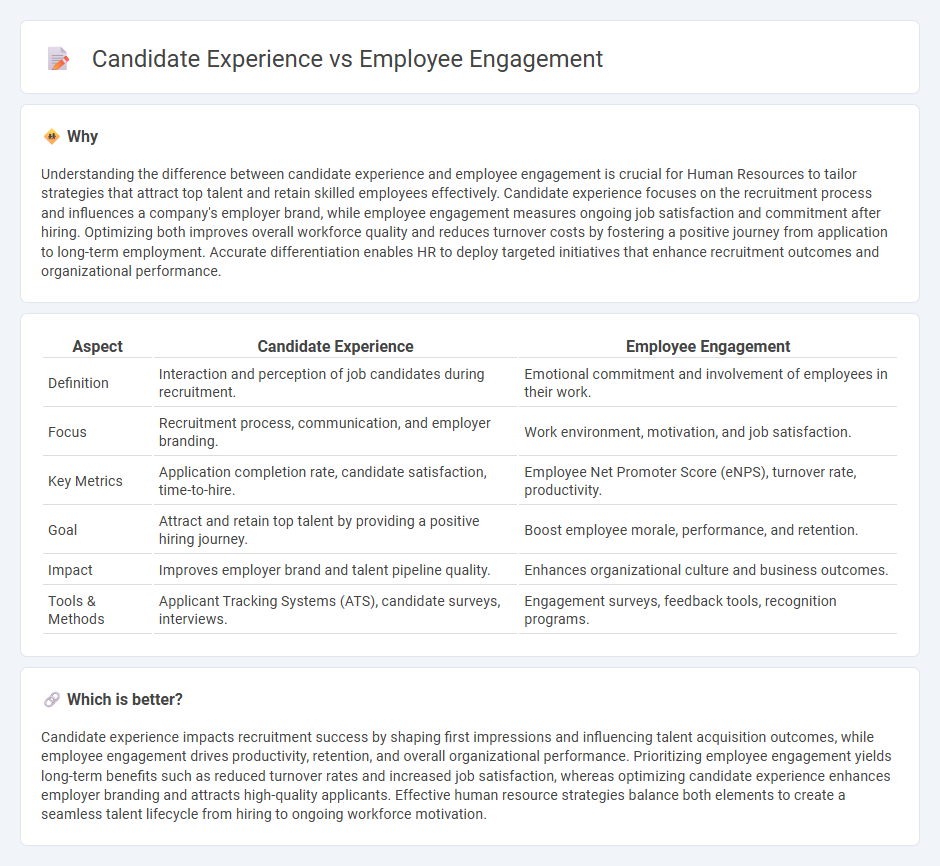
Candidate experience focuses on the recruitment journey, shaping first impressions through transparent communication, timely feedback, and a seamless application process to attract top talent. Employee engagement centers on fostering a motivated, productive workforce by promoting meaningful work, recognition, and growth opportunities. Discover how optimizing both candidate experience and employee engagement drives organizational success.
Why it is important
Understanding the difference between candidate experience and employee engagement is crucial for Human Resources to tailor strategies that attract top talent and retain skilled employees effectively. Candidate experience focuses on the recruitment process and influences a company's employer brand, while employee engagement measures ongoing job satisfaction and commitment after hiring. Optimizing both improves overall workforce quality and reduces turnover costs by fostering a positive journey from application to long-term employment. Accurate differentiation enables HR to deploy targeted initiatives that enhance recruitment outcomes and organizational performance.
Comparison Table
| Aspect | Candidate Experience | Employee Engagement |
|---|---|---|
| Definition | Interaction and perception of job candidates during recruitment. | Emotional commitment and involvement of employees in their work. |
| Focus | Recruitment process, communication, and employer branding. | Work environment, motivation, and job satisfaction. |
| Key Metrics | Application completion rate, candidate satisfaction, time-to-hire. | Employee Net Promoter Score (eNPS), turnover rate, productivity. |
| Goal | Attract and retain top talent by providing a positive hiring journey. | Boost employee morale, performance, and retention. |
| Impact | Improves employer brand and talent pipeline quality. | Enhances organizational culture and business outcomes. |
| Tools & Methods | Applicant Tracking Systems (ATS), candidate surveys, interviews. | Engagement surveys, feedback tools, recognition programs. |
Which is better?
Candidate experience impacts recruitment success by shaping first impressions and influencing talent acquisition outcomes, while employee engagement drives productivity, retention, and overall organizational performance. Prioritizing employee engagement yields long-term benefits such as reduced turnover rates and increased job satisfaction, whereas optimizing candidate experience enhances employer branding and attracts high-quality applicants. Effective human resource strategies balance both elements to create a seamless talent lifecycle from hiring to ongoing workforce motivation.
Connection
Candidate experience directly impacts employee engagement by shaping initial perceptions of company culture and communication transparency. Positive candidate interactions increase the likelihood of higher retention rates and stronger commitment once hired, fostering a motivated and productive workforce. Organizations that prioritize seamless recruitment processes often see improved job satisfaction and overall employee performance.
Key Terms
Motivation
Employee engagement drives motivation by fostering a positive work environment, enhancing job satisfaction, and boosting productivity among current staff. Candidate experience influences motivation early by shaping perceptions of a company's values, culture, and opportunities during the recruitment process. Explore how aligning both employee engagement and candidate experience strategies can maximize organizational motivation and performance.
Onboarding
Effective onboarding enhances employee engagement by fostering a positive work environment and clear expectations from day one, reducing turnover rates and increasing productivity. Candidate experience during onboarding shapes first impressions, influencing long-term commitment and employer brand reputation. Discover strategies to optimize onboarding for both employee engagement and candidate experience.
Recruitment
Employee engagement enhances recruitment by fostering a positive employer brand and increasing referral rates, attracting top talent through authentic workplace culture. Candidate experience impacts recruitment success by ensuring smooth communication, timely feedback, and respectful interactions that build trust and encourage acceptance of job offers. Explore effective strategies to align employee engagement and candidate experience for superior recruitment outcomes.
Source and External Links
Why employee engagement is key to company success - Employee engagement boosts productivity by 18%, profitability by 23%, and reduces absenteeism by 78%, making it a critical strategic business objective that leads to higher employee retention and performance.
How to Improve Employee Engagement in the Workplace - Gallup research shows engaged employees contribute to 10% higher customer loyalty, 23% higher profitability, 78% less absenteeism, and significantly lower turnover, resulting in stronger business outcomes regardless of industry.
What is Employee Engagement? (And How to Boost It) - Employee engagement improves productivity by 17%, reduces absenteeism by 41%, decreases workplace injuries, and enhances trust in leadership by making employees feel valued and connected to their roles and company.
 dowidth.com
dowidth.com